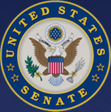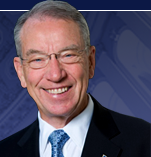Grassley News
Senate Vote on Year-End Tax Plan... Read More >>
Grassley Good Government Amendment Clears Senate... Read More >>
November 27, 2012
WASHINGTON – Senator Chuck Grassley today made a special trip to the White House to witness the signing of the Whistleblower Protection Enhancement Act which strengthens existing law to better protect whistleblowers.
Grassley was a co-author of the legislation being signed into law today, and the original 1989 Whistleblower Protection Act it updates. The legislation was necessary because whistleblowers are being denied the protections they should have under the law because of decisions of the Merit Systems Protection Board, the Federal Circuit Court of Appeals, and a general anti-whistleblower sentiment found in executive branch agencies.
“As one of the authors of the original Whistleblower Protection Act, and a long-time advocate for whistleblowers, it’s wonderful to see this legislation signed into law. Whistleblowers strengthen our system of checks and balances, and that strengthens our system of representative government. It’s a constant battle to make sure that these patriotic citizens who shed light on overspending, mismanagement and layers of ineffective leadership within the federal government are protected,” Grassley said after the signing in the Oval Office. “Now, more work needs to be done to ensure that FBI whistleblower protections are updated and that intelligence community whistleblowers are covered under the law and given the protections they deserve.”
A long-time advocate for whistleblowers, Grassley has stood up against the heavy hand of the bureaucracy – regardless of whether Republicans or Democrats were in charge -- for individual whistleblowers from the Pentagon, the FBI, the Bureau of Alcohol, Tobacco, Firearms and Explosives, the IRS, the Interior Department, the Department of Health and Human Services, the Food and Drug Administration, and the Securities and Exchange Commission.
In addition to co-authoring the 1989 whistleblower law, Grassley also authored the 1986 update of the False Claims Act to include qui tam provisions that empower private citizens, who had information about fraudulent activity by government contractors, to bring wrongdoing forward and sue in the name of the government. To date, these whistleblower provisions have recovered more than $30 billion for taxpayers that otherwise would be lost to fraud.
In 2009, Grassley and Senator Patrick Leahy won passage of the Fraud Enforcement and Recovery Act which made the most significant improvements to the False Claims Act since 1986. The law restores the scope and applicability of the False Claims Act where it had been limited by court decisions. This effort also revised criminal laws to help prosecute mortgage fraud, securities fraud, and complex financial crimes that led to the 2008 financial crisis.
In addition, Grassley authored the 2006 overhaul of the IRS whistleblower program to fight major tax fraud. The IRS recently paid out its largest award ever, but has acknowledged, after scrutiny from Grassley, that the agency must be more timely and responsive in processing whistleblower claims.
The Whistleblower Protection Enhancement Act of 2012 will:
• clarify that any disclosure of gross waste or mismanagement, fraud, abuse, or illegal activity may be protected, but not disagreements over legitimate policy decisions;
• suspend the sole jurisdiction of the Federal Circuit Court of Appeals over federal employee whistleblower cases for two years;
• extend Whistleblower Protection Act coverage and other non-discrimination and anti-retaliatory laws to all employees of the Transportation Security Administration;
• clarify that whistleblowers may disclose evidence of censorship of scientific or technical information under the same standards that apply to disclosures of other kinds of waste, fraud, and abuse;
• codify portions of the anti-gag provision, which Grassley originally got passed, that has been part of every Transportation-Treasury Appropriations bill since 1988;
• establish Whistleblower Protection Ombudsmen to educate agency personnel about whistleblower rights; and
• provide the Office of Special Counsel with the independent right to file "friend of the court" briefs, or amicus briefs, with federal courts.




